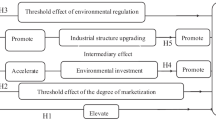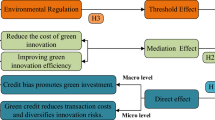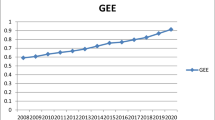Abstract
This paper aims to objectively identify the impact of green finance on the green economy of China, and then put forward some suggestions that good for the government to guide the development of green finance, and promote the full play of finance in promoting development of the green economy. Through constructing an index system and a super-efficiency slack-based model, this study measures the level of green financial development and regional ecological efficiency, respectively, for Chinese 30 provinces between 2010 and 2015. On this basis, taking per capita GDP, industrial structure, urbanization rate, and energy efficiency as controlling variables, we construct a varying intercept model and a varying coefficient model. Our primary findings are that the impact of China’s green financial development on regional ecological efficiency is not obvious in general, and the corresponding average influence coefficient is − 0.1847, which is inconsistent with theoretical analysis. Also, other impacts from per capita GDP, industrial structure, urbanization rate, and energy efficiency on ecological efficiency are statistically significant; the coefficients are − 0.1701, 0.3901, 0.5410, and 0.3022, respectively. Moreover, there are significant regional differences in the impacts of green financial development on ecological efficiency. For some provinces, such as Tianjin, Jilin, and Heilongjiang, green financial development significantly promotes ecological efficiency. However, for Beijing, Jiangsu, and Zhejiang, it is inconsistent with theoretical analysis.



Similar content being viewed by others
References
Antimiani A, Costantini V, Markandya A et al (2017) The Green Climate Fund as an effective compensatory mechanism in global climate negotiations. Environ Sci Policy 77:49–68
Chami R, Cosimano TF, Fullenkamp C (2002) Managing ethical risk: how investing in ethics adds value. J Bank Finance 9:1697–1718
Charfeddine L, Mrabet Z (2017) The impact of economic development and social-political factors on ecological footprint: a panel data analysis for 15 MENA countries. Renew Sustain Energy Rev 76:138–154
Chen P, Lu Y-T, Gao J et al (2016) Study on the construction and propulsion mechanism of green financial system in China. Environ Prot Sci 1:52–56 (in Chinese)
Chen NC, Lei X, Chen ZQ (2017) Environmental efficiency analysis of the Yangtze River Economic Zone using super efficiency data envelopment analysis (SEDEA) and tobit models. Energy 134:659–671
Climent F, Soriano P (2011) Green and good? The investment performance of US environmental mutual funds. J Bus Ethics 103(2):275–287
Cowan E (1999) Topical issues in environmental finance. Research paper was commissioned by the Asia Branch of the Canadian International Development Agency (CIDA) 1:1–20
Cui L, Huang Y (2018) Exploring the schemes for green climate fund financing: international lessons. World Dev 101:173–187
Durusu-Ciftci D, Ispir MS, Yetkiner H (2017) Financial development and economic growth: some theory and more evidence. J Policy Model 39(2):290–306
Flaherty M, Gevorkyan A, Radpour S et al (2016) Financing climate policies through climate bonds–a three stage model and empirics. Res Int Bus Finance 42:468–479
Galaz V, Gars J, Moberg F et al (2015) Why ecologists should care about financial markets. Trends Ecol Evol 30(10):571–580
Gao Y, Li Z, Wang F et al (2018) A game theory approach for corporate environmental risk mitigation. Resour Conserv Recycl 130:240–247
He Y-Q, Chen L-X, Jiao J-X et al (2017) Study on the relationship between spatial–temporal differences of financial agglomeration and provincial ecological efficiency. Math Stat Manag 1:162–174 (in Chinese)
Ho TQ, Hoang VN, Wilson C et al (2018) Eco-efficiency analysis of sustainability-certified coffee production in Vietnam. J Clean Prod 183:251–260
Holdren JP, Ehrlich PR (1974) Human population and the global environment. Am Sci 62(3):282–292
Hu B, Fu Y-T (2016) Empirical study on ecological efficiency measurement and spatial difference in China-based on the analysis of SBM model and spatial autocorrelation. J Arid Land Resour Environ 6:6–12 (in Chinese)
Huang JH, Lv H-L, Wang J-L (2014a) The mechanism of the influence of financial development on regional green development-based on the research of ecological efficiency and spatial quantity. Geogr Res 33(03):532–545 (in Chinese)
Huang J, Yang X, Cheng G et al (2014b) A comprehensive eco-efficiency model and dynamics of regional eco-efficiency in China. J Clean Prod 67:228–238
Júnior RDL, Nunes AO, Silva DAL (2018) Creating value with less impact: lean, green and eco-efficiency in a metalworking industry towards a cleaner production. J Clean Prod 196:517–534
Li M, Ding H (2016) Research on the construction of green financial system under the framework of “the belt and road initiative”. Environ Prot 19:31–35 (in Chinese)
Li Y, Li Y-B (2015) An empirical analysis on the evolution of ecological efficiency and its influencing factors in China. Stat Decis 15:120–122 (in Chinese)
Li Q, Li S-S (2017) The impact of fiscal expenditure and financial development on economic growth: nonlinear effect and correlation mechanism. Financ Res 2:21–29 (in Chinese)
Li J-J, Luo N-S (2016) The influence of urban scale on ecological efficiency and regional difference analysis. Popul Resour Environ China 2:129–136 (in Chinese)
Li B, Song C-X, Wu J (2016) Financial agglomeration and regional economic growth driven by innovation. Financ Sci 1:88–99 (in Chinese)
Liu B-Q, Li L-M, Song J-K (2011) Measurement and difference analysis of regional ecological efficiency in China. Techno-Econ Manag Res 10:3–6 (in Chinese)
Mao J-S, Zeng R, Du C-Y et al (2010) Eco-efficiency of China’s industrial sectors. Environ Sci 11:2788–2794 (in Chinese)
Ng AW (2018) From sustainability accounting to a green financing system: institutional legitimacy and market heterogeneity in a global financial centre. J Clean Prod 195:585–592
Pham L (2016) Is it risky to go green? A volatility analysis of the green bond market. J Sustain Finance Invest 6(4):263–291
Qiu S (2008) Study on the ecological efficiency of regional economic development in China. Energy Environ 4(8–10):13 (in Chinese)
Salazar J (1998) Environmental finance: linking two world. In: A workshop on financial innovations for biodiversity, vol 1. Bratislava, pp 2–18
Schaltegger S, Sturm A (1990) Ökologische Rationalität: Ansatzpunkte zur Ausgestaltung von ökologieorientierten Managementinstrumenten. Die Unternehmung 44(4):273–290
Scholtens B (2017) Why finance should care about ecology. Trends Ecol Evol 32(7):500
Song M, Song Y, An Q et al (2013) Review of environmental efficiency and its influencing factors in China: 1998–2009. Renew Sustain Energy Rev 20:8–14
Uddin GA, Salahuddin M, Alam K et al (2017) Ecological footprint and real income: panel data evidence from the 27 highest emitting countries. Ecol Ind 77:166–175
Wang H, Wheeler D (2005) Financial incentives and endogenous enforcement in China’s pollution levy system. J Environ Econ Manag 49(1):174–196
Xing Z-C, Wang J-G, Zhang J (2014) Study on the total factor ecological efficiency and its influencing factors in China’s region. China Popul Resour Environ 28(07):119–126 (in Chinese)
Yang Y-C (2014) Financial development and economic growth: based on the analysis of the threshold variable of China’s financial. Financ Res 2:59–71 (in Chinese)
Yang J-Y, Zhang S-D (2018) Research on the spatial effect of regional financial development on economic growth. J Hunan Univ (Social Sciences) 32(01):82–92 (in Chinese)
Yang Y, Lan Q, Liu P et al (2017) Insurance as a market mechanism in managing regional environmental and safety risks. Resour Conserv Recycl 124:62–66
Zeng X-W, Liu Y-Q, Man MJ et al (2014) Analysis and measurement of the development of green finance in China. J China Yan’an Cadre Coll 7(06):112-121 + 105 (in Chinese)
Zheng D-F, Hao S, Sun C-Z, Lv L-T (2018) Temporal and spatial evolution analysis and trend prediction of ecological efficiency in China. Geogr Res 37(05):1034–1046 (in Chinese)
Acknowledgements
The authors are grateful for the financial support provided by the Key Program of National Statistical Science Research of China under Grant No. 2016LZ13, the Ministry of Education of Humanities and Social Science project of China under Grant No. 16YJAZH015, and the National Natural Science Foundation of China under Grant No. 71742001, 71203219.
Author information
Authors and Affiliations
Corresponding author
Ethics declarations
Conflict of interest
The authors declare that they have no conflict of interest.
Rights and permissions
About this article
Cite this article
Liu, R., Wang, D., Zhang, L. et al. Can green financial development promote regional ecological efficiency? A case study of China. Nat Hazards 95, 325–341 (2019). https://doi.org/10.1007/s11069-018-3502-x
Received:
Accepted:
Published:
Issue Date:
DOI: https://doi.org/10.1007/s11069-018-3502-x




